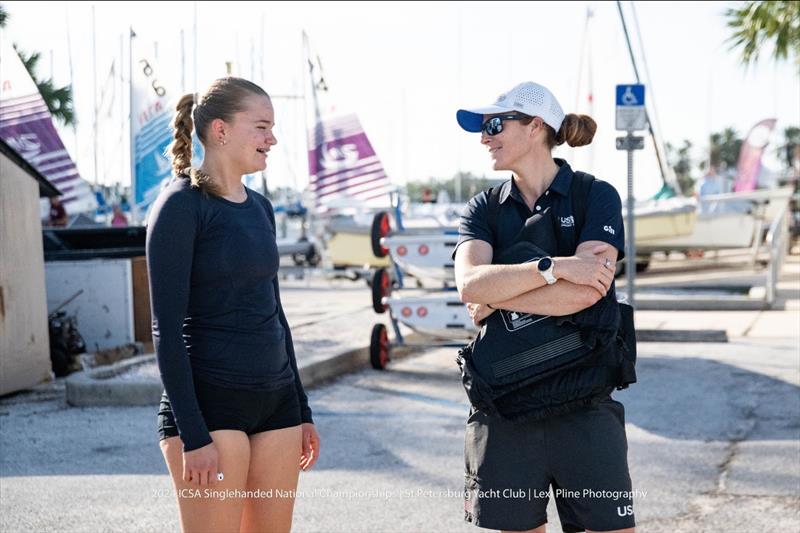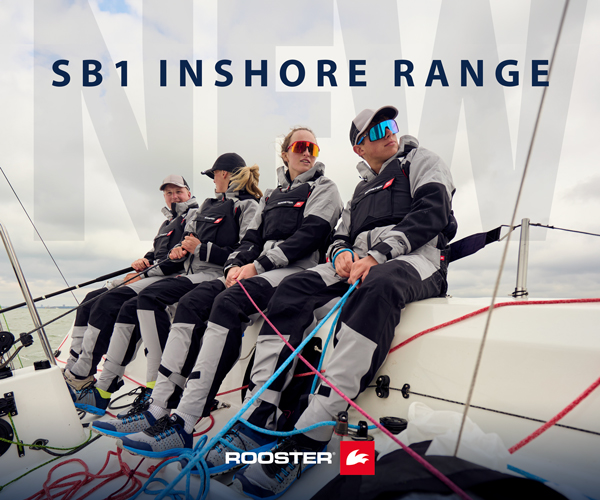
College Sailing and Olympic Development: A New Era of Collaboration
by US Sailing Team 17 Nov 09:11 PST

Olympic Development Director Rosie Chapman meets with Harvard’s Kate Danielson, an ILCA 6 college sailing athlete competing at the 2024 ICSA Singlehanded National Championship in St. Petersburg, FL © Lexi Pline Photography


A discussion featuring Intercollegiate Sailing Association (ICSA) President Greg Wilkinson and US Sailing Olympic Development Director Rosie Chapman.
In the United States, college sailing teams and the Olympic Development Program (ODP) share a historical focus on the same group of athletes: those who have recently graduated high school and are eager for achievement in both academics and sports, including aspirations for an Olympic podium. Over the years, shifts in US Olympic Sailing leadership have influenced the level of cooperation between these two programs, often negatively affecting young athletes who had to choose between them. However, with a transformative change, US Sailing’s latest ODP Director Rosie Chapman is determined to enhance collaboration between college sailing and the ODP. Chapman recognizes the advantages within the collegiate realm and its capacity to foster a high-performance training environment that benefits athlete success in both fields concurrently.
US Sailing engaged in a conversation with Chapman and ICSA President Greg Wilkinson to gain insight into their initial perceptions, the efforts already undertaken to adjust programming with student-athletes in mind, and their vision for the future, along with the potentials for college sailing, Olympic sailing, and American sailing overall.
US Sailing: Rosie, your role as the Olympic Development Director is new, and you are also relatively new to the American college sailing scene. It’s a unique environment compared to other scholastic sailing circuits globally. What are your impressions now that you’ve begun to explore ICSA?
Rosie: “Great question! My first significant experience with college sailing occurred this past May in Boston. I’d heard that the Charles River is an iconic college sailing venue, and it certainly provided both challenges and fascinating sailing! I was immediately struck by the level of intensity and skill displayed. Calling it ‘talent’ feels inadequate; looking at the students gathered on the docks at the MIT venue, I recognized many Youth Worlds medalists I had coached over the past four years. I realized that these sailors race against each other not every few months, as in the Olympic class racing circuit, but every few days! Another impression I walked away with was how dynamic and intense the atmosphere is. A great sense of camaraderie was present; the energy was palpable.”
“Last weekend, I supported the race committee at the Singlehanded National Championship, witnessing all the action in St. Petersburg. The athlete lineup alone indicated an exciting competition, and they delivered just that.”
“The competitors faced numerous scenarios in quick succession, and tighter courses allowed for back-to-back racing. One athlete approached me on the water between races and summarized it perfectly, saying, ‘College sailing is sharpening my mental strength—there are so many races I don’t have time to sulk over previous results. I must reset.’ They went on to win the subsequent race. What I observed was impressive, and it was a fantastic weekend to engage with the athletes and coaches. Frequent check-ins facilitate positive connections, and I am grateful for these opportunities to interact and nurture relationships.”
US Sailing: Greg, you have interacted with the Olympic realm during your time coaching at Boston College, most recently with alum Erika Reineke in Marseille, and now as President of ICSA. What has your experience been like regarding athletes juggling both college sailing and ODP, considering both programs attract the same age range?
Greg: “I can hardly believe it myself, but this marks the seventh quad I’ve coached Olympic campaigners dating back to the 2000 Trials in San Francisco. My experiences with athletes pursuing both Olympic and college sailing ambitions have varied significantly. At times, there has been strong collaboration between US Olympic Sailing and college sailing, while at others, friction and even competition for athletes’ time and focus emerged. I feel fortunate to lead college sailing during a period where we are clearly making strides towards hopefully stronger collaboration between US Olympic Sailing and college sailing.”
US Sailing: Rosie, you’ve now visited four colleges that Greg recommended, allowing you to see their facilities and practices and understand student-athlete life. Even though more visits are ahead, what are your initial takeaways from your visits so far?
Rosie: “I accepted the position at US Sailing in May as the Olympic Development Director, and one of my priorities was to investigate collaboration with college sailing. I recognized it wouldn’t be simple, but it was vital for me to grasp how US Sailing could assist athletes on their Olympic journeys alongside their college coaches. Initially, experiencing college sailing culture was crucial. So I visited the Charles during the sunny days of May for the 2024 College Sailing National Championship. I aimed to understand firsthand and meet people naturally.”
“I also wanted to initiate discussions with Greg about how college sailing and US Sailing could collaborate. Greg advised me to visit colleges to observe athletes in their training settings, meet sailing coaches and strength trainers, tour their campuses, attend practice sessions, and gain a genuine feel for student-athlete life. Due to the impossibility of visiting every college in one go, I decided to visit four this fall. We prioritized colleges with the highest number of current sailors engaged in the ODP program, and I am enthusiastic about exploring many more colleges.”
“Thus far, my experiences have been very positive. Each school offers its unique environment, but all have coaches eager to collaborate with the ODP program and provide valuable insights. It’s not about me imposing directives—rather, I am learning more with each visit on how we can enhance together. This journey has allowed me to reconnect with sailors who may have dropped off the Youth pathway or to encounter those unaware that Olympic sailing is an option. College athletes participating in the ODP program have the opportunity to transition strongly into their Olympic campaigns if we support them correctly.”
US Sailing: Greg, what aspects of student-athlete life and college sailing programs do you believe provide advantages for the Olympic Development movement?
Greg: “For many, college sailing delivers access to professional resources that most Olympic sailing programs aim for. As Rosie observed during her visits, a typical day for many college sailors involves collaboration with professional strength and conditioning coaches, academic support staff, athletic trainers, sports psychologists, and experienced sailing coaches. These resources are consistently available throughout four years in a residential setting, making them accessible for the Olympic Development movement.”
“Rosie not only seems eager to utilize collegiate resources but also has plans to integrate Olympic resources into college sailing experiences. By improving coordination between collegiate professionals and those in the Olympic program, college sailors can access high-level, sport-specific expertise otherwise unavailable to their coaches.”
US Sailing: Conversely, Rosie, what elements of the ODP environment do you think enhance the college sailing athlete experience?
Rosie: “These athletes compete against one another in the college realm, but during ODP camps, they become part of a unified ODP team, creating a unique and valuable environment for their four years in conjunction with their collegiate racing circuit. At ODP camps, athletes gain insights from class-specific coaches, improving their technical understanding of their class, while at college, they spend significant time in small fleets making vital tactical decisions every weekend. The two environments can mutually benefit each other. I aim to ensure that athletes entering the ODP context receive maximum value during their time and make the right motions in their Olympic-class boats. While we are eager to utilize some collegiate resources, we also look forward to sharing some resources and systems we have developed in return.”
US Sailing: The vast majority of US Sailing Team and Olympic athletes are either currently in college or are alums. For both of you, what advice do you have for young sailors interested in pursuing high-level sailing post-youth?
Rosie: “Based on my limited interactions with college coaches, I emphasize transparency and communication; articulate your goals to both myself and your college coach. It’s essential to plan ahead and keep open lines of communication. It’s not an easy task to balance academics, college sailing, and Olympic sailing, but it is achievable and presents an exciting adventure. I would also advise realism—acknowledge that you cannot do everything, and be mindful that it often requires sacrifices, though it pays off in the end. Additionally, many athletes choose to take a gap year or two during an Olympic cycle. If communicated well in advance, this can be beneficial for everyone.”
Greg: “At the recent Olympics, college sailors competed in seven out of ten classes, qualified for medal races in five, and ultimately secured two medals!* College sailing does NOT hinder Olympic success! Be open about your Olympic aspirations with college coaches and work on plans proactively—seek assistance from them. Academics will typically be your largest, least flexible commitment in college, and while college sailing usually aligns with classes, some international events and select domestic competitions may conflict, so planning is crucial!”
US Sailing: For both of you again, what character traits do you notice among your top athletes, and what traits do you seek in team members?
Rosie: “Attributes demonstrated by successful athletes include commitment, determination, effective communication, and dedication to their goals. Those who excel are the ones putting in late hours for schoolwork and then being the first to hit the gym in the morning. It’s challenging but entirely possible and incredibly rewarding.”
Greg: “College sailing necessitates a genuine team effort. Other than our fall individual singlehanded championships, our major events require not just several individuals but multiple boats to win—the best sailors to emerge from my program have enhanced those around them, recognizing that winning is impossible without collective effort.”
US Sailing: Rosie, what changes have you implemented in designing the new Olympic Development Program? How are you navigating this stage of building the pipeline… what’s innovative?
Rosie: “The truth is that both college sailing and the Olympic Development Program significantly impact an athlete’s journey, and my primary goal is to ensure athletes can excel in both arenas. Greg has been pivotal in educating me about college sailing and collaborating with me. As an example, at the beginning of this fall, I presented the ODP schedule to several coaches for feedback, aiming to create a calendar that allows athletes to participate in both ODP camps and essential college events without difficult choices. I want to prevent athletes from feeling torn or unsuccessful. Although our camps this fall and winter won’t perfectly align with every individual’s schedule and conflicts will arise, this is a positive beginning. With improved communication, we can work collaboratively. I sense a burgeoning group of athletes within both the ODP and college settings, paired with optimism for both programs rather than unease.”
Greg: “From the college sailing perspective, what’s fresh in Rosie’s approach is intentional collaboration and inquiry. Before scheduling ODP events this fall, Rosie extensively consulted with me and others regarding academic calendars (the most rigid conflict in a college sailor’s hectic schedule) followed by the collegiate sailing calendar. This inquiry has allowed us to explore what resources college sailing might provide that ODP could utilize to enhance athlete support.”
US Sailing: Looking forward, Rosie, what unique opportunities for this quad leading up to Los Angeles 2028 do you foresee?
Rosie: “Home Games don’t occur very often. For athletes currently involved, this represents a tremendous opportunity! We have the chance to develop individual plans with athletes to optimize their college time while simultaneously preparing for an Olympic campaign. I’ve already had numerous athletes consult me on when to consider taking a gap year, and we are initiating vital discussions between the athlete, their college coach, and me. As a country, we possess immense talent within the college program, and I am eager to see how many current ODP athletes will race at LA28.”
US Sailing: To wrap things up, both of you, what about the future of College Sailing, ODP, the convergence of the two programs, and the broader trajectory of American sailing excites you?
Greg: “I’m enthusiastic about entering what feels like a new chapter of synergy between college sailing and the US Olympic program. Although Rosie and I have only collaborated on this for a few months, the cooperation has exceeded my expectations and is already yielding benefits for college sailors and Olympic aspirants!”
Rosie: “Opportunity, opportunity, opportunity! These athletes enjoy four years surrounded by exemplary support systems: strength and conditioning, nutrition, psychological health, and a team-oriented environment, among other resources. Athletes can emerge from their collegiate experience as well-rounded competitors—physically, mentally, and tactically fortified. My ambition is for us to strive toward a seamless transition into Olympic campaigning.”
* USA Bronze for Ian Barrows (Yale University) and Hans Henken (Stanford University) in the 49er; Peru Bronze for Stefano Peschiera (College of Charleston) in the ILCA 7.

